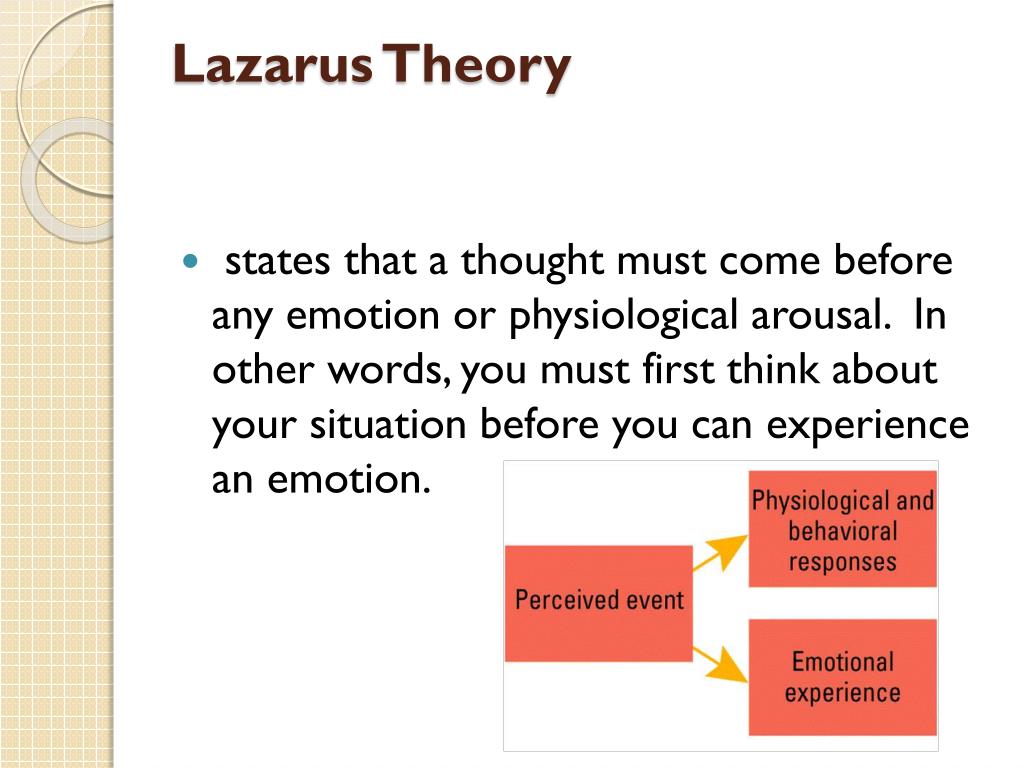

The basic theme that thought causes emotion is often referred to as Referred to as the "trilogy of mind." A theory of emotion is, in effect, a theory of how motivation and cognition produce emotions in adaptationally relevant encounters. Over centuries of psychological thought there have been diverse conceptualizations of the relations among cognition, motivation, and emotionor what Nevertheless, there is no mention of motivation, the other essential construct of a cognitivemotivationalrelational theory of emotion. Notice that his analysis makes implicit use of the ideas of relationship, appraisal, and action tendency, which are central concepts in many recent emotion theories. Aristotle wrote that "Anger may be defined as a belief that we, or our friends, have been unfairly slighted, which causes in us both painful feelings and a desire or impulse for revenge" (p. This reflects the latter's special interest in how emotions could be manipulated by orators and politicians (see Aristotle suggested that people are made angry by the thought that they had been unfairly slighted.Įxpressed the classical readers' surprise that Aristotle discussed the emotions in The cognitive movement in social science, which got rolling in the 1960s and 1970s, brought with it a return to a position about emotion that seems to have originated with Aristotle: The ways people construe their social situations have causal significance for their emotional reactions. The main concerns of this article are the role of cognition in emotion, the ways meaning is generated, unconscious appraising, and the implications of these issues for life-span developmental psychology. Now I would like to clarify and deepen my analysis of appraisal. ), I have been concerned with stress and emotion, which I view from a cognitive and phenomenological perspective. In much of my writing, including my own book on emotion ( For those who are fascinated by the fads and fashions of science, this is especially interesting because emotion had almost been written off as a legitimate subject for theory and research until it began to revive in the 1960s and 1970s. Much attention in the life sciences is now being directed to the emotions. Lazarus,ĭepartment of Psychology, University of California at Berkeley, Tolman Hall, Berkeley, CA, 94720. Smith, at Vanderbilt, for their very useful comments on this article.Ĭorrespondence may be addressed to Richard S. I am indebted to Eleanor Rosch and Joseph Campos, both at the University of California at Berkeley, and Craig A.


This article was originally presented as a Distinguished Scientific Contributions award address at the 98th Annual Convention of the American Psychological Association in Boston in August 1990. The idea that there is more than one way meaning is achieved strengthens and enriches the case for the role of appraisal in emotion and allows the consideration of what is meant by unconscious and preconscious appraisal and the examination of how they might work. Automatic processing without awareness is contrasted with deliberate and conscious processing, and the concept of resonance between an animal's needs and what is encountered in the environment is examined. The discussion of how meaning is generated is the core of the article. This position is examined in light of what is known about emotions in infants and young children, the effects of drugs on acute emotions and moods, and recent patterns of thought about the brain in emotions. It is argued that appraisal is a necessary as well as sufficient cause of emotion and that knowledge is necessary but not sufficient. The role of cognitionand to some extent motivationin emotion, the ways meaning is generated, unconscious appraising, and the implications of this way of thinking for life-span development are addressed. © 1991 by the American Psychological Associationįor personal use only-not for distribution.


 0 kommentar(er)
0 kommentar(er)
